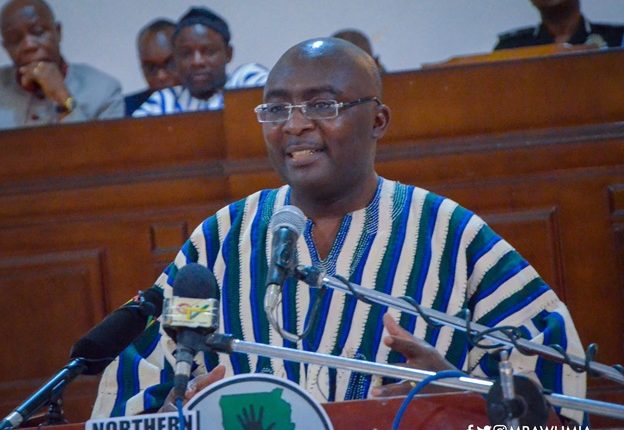A major priority of the Government of President Akufo-Addo as part of its agenda of inclusive transformation is to bridge the development gap between the north and the south, Vice President Mahamudu Bawumia has disclosed.
Thus, programmes, such as Free Senior High School, Planting for Food and Jobs, Planting for Export and Rural Development, Rearing for Food and Jobs Initiative, One Village One Dam, One District One Warehouse, Irrigation Schemes and the construction of water systems are being implemented and will be important in closing the gap over time.
Speaking at the maiden Northern Region Development Summit at Tamale on Thursday 30th May, 2019, Vice President Bawumia bemoaned the gaps in many areas between the north and the south, while noting that there are also many areas in the South in places like Central and Western North regions that are also very underdeveloped (which is why government has established the Coastal, Middle Belt and Northern Development Authorities).
“The recent UNDP Northern Ghana Human Development Report 2018, made a key finding. That is, as recent as 2014, the National Human Development Index for our country stood at 0.575 on the average. Unfortunately, Northern Ghana as a region had a Human Development Index of only 0.116. This index centers on Health, Education and Living Standards. Other development indications in the report are more worrying.”
According to Vice President Bawumia, President Akufo-Addo is very troubled by the development gap, and is determined to do what it takes to bridge it through a deliberate roll out of development programmes.
“The President has been very clear that one of the legacies he wants to see is to bridge that gap between the north and the south, and we are moving in that direction,” Vice President Bawumia stated.
Interventions in the agriculture sector through the Planting for Food and Jobs programme, which has provided greater access to seeds, extension services and subsidised fertiliser are also yielding positive results in the north, where agriculture is the major source of employment, Vice President Bawumia continued.
Plans are also afoot to increase the acreage of government funded irrigable land from 12,980 to 60,000 through the construction of the Multipurpose Pwalugu Dam and Phase II of the Bui Dam project, with Agric Mechanisation Centres designed to provide help with ploughing and other services also in the offing, Vice President Bawumia disclosed.
“Access to affordable education is also very important to the President, that is why we have implemented the Free SHS, to ensure inclusive transformation. I always say Free SHS has been more beneficial to northern Ghana than anywhere else. People have said that free education has always been in the north, but you and I know that it was not totally free. But Free SHS has changed all that. In every village that I have visited, it is clear that it is helping,” he emphasised.
Apart from the Pwalugu Multipurpose Dam, other projects in the pipeline include the Volta Lake Transport between Akosombo and Buipe, the Integrated Iron and Steel Industry using the Iron Ore Reserves at Yendi, the Tamale Airport Terminal to start in June, and the Accra- Paga railway line which will all help bridge the gap between the north and the South.
Vice President Bawumia expressed worry about the sporadic disturbances in some parts of northern Ghana, pointing out that conflict retards growth and scares investors away.
“As people of Northern Ghana, we must strive to build peace regardless of our political, ethnic, and religious persuasions or affiliations. We must be able to put the past behind us and seek only to pursue an agenda that will pool our resources together to build a just, fair and prosperous society where there is an equitable distribution of our Regions’ wealth to the benefit of our people.”
Hitherto known as the Mole Series, the Summit, under the theme “Accelerating the Sustainable Development of Northern Ghana in the context of Peace, Security and Ghana Beyond Aid”, is being attended by Senior Government Officials including Ministers for all five Regions, Ghana’s Development Partners, Civil Society Organisations and Members of Academia.





